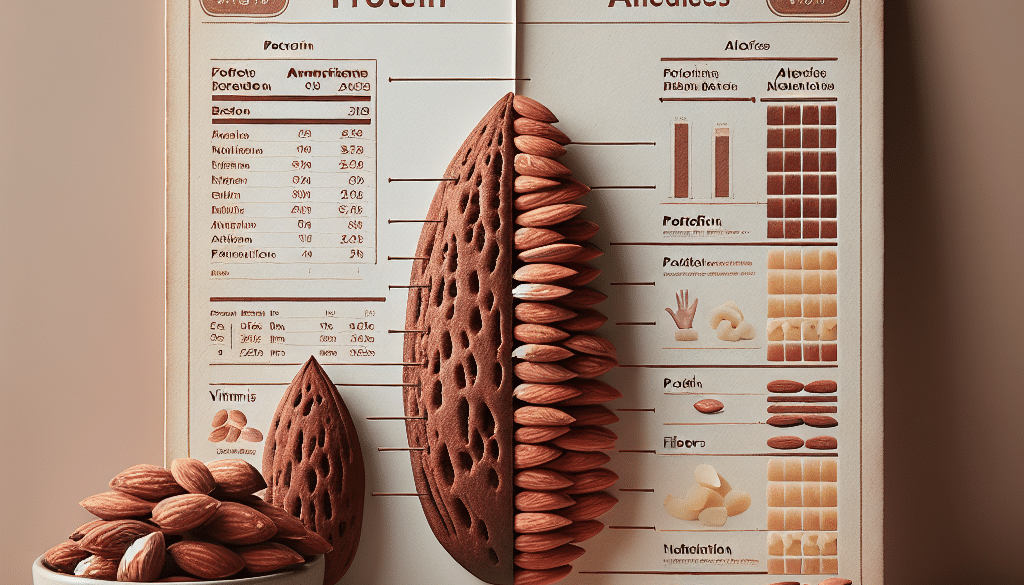Is It Better To Eat Almonds With Skin Or Without?
-
Table of Contents
- Almonds With Skin or Without: Which Is the Better Choice?
- Nutritional Profile of Almonds
- Almonds With Skin: The Benefits
- Blanched Almonds: The Case for Skinless
- Scientific Evidence and Case Studies
- Conclusion: Making the Right Choice for You
- Enhance Your Diet with ETprotein’s Quality Protein Products
Almonds With Skin or Without: Which Is the Better Choice?

Almonds are a powerhouse of nutrients, offering a rich blend of fiber, protein, healthy fats, vitamins, and minerals. They are a popular snack and a versatile ingredient in various culinary preparations. However, when it comes to consuming almonds, a common question arises: is it better to eat them with skin or without? This article delves into the nutritional aspects, health benefits, and considerations of both forms of almonds to provide a comprehensive understanding.
Nutritional Profile of Almonds
Before we compare the two forms of almonds, let’s first look at their nutritional content. Almonds are known for their high nutrient density, which includes:
- Dietary fiber
- Protein
- Monounsaturated fats
- Vitamin E
- Magnesium
- Calcium
- Phosphorus
- Potassium
- Antioxidants
These nutrients contribute to various health benefits, such as supporting heart health, aiding in weight management, and providing antioxidant protection.
Almonds With Skin: The Benefits
Almonds with skin are in their most natural state. The skin of the almond contains a significant amount of dietary fiber and flavonoids, which are potent antioxidants. Here are some of the benefits of eating almonds with their skin intact:
- Antioxidant Power: The skin of almonds is rich in polyphenols, a type of antioxidant that works synergistically with vitamin E, also found in almonds, to combat oxidative stress and inflammation.
- Dietary Fiber: Almond skin contributes to the overall fiber content of the nut, which aids in digestion, helps maintain a healthy gut microbiome, and promotes satiety.
- Heart Health: Studies have shown that the flavonoids in almond skins, in combination with the vitamin E in the nut itself, can enhance heart health by reducing the risk of coronary artery disease.
Moreover, the presence of almond skin may help in the prevention of certain diseases. For instance, research suggests that the flavonoids and phenolic acids in almond skins have anti-inflammatory and anticancer properties.
Blanched Almonds: The Case for Skinless
Blanched almonds are those that have been treated with hot water to soften the skin, which is then removed. Some people prefer blanched almonds for their texture and taste, as well as for certain culinary applications where a smoother texture is desired. Here are some considerations for eating blanched almonds:
- Texture and Taste: Without the skin, almonds tend to have a softer texture and a slightly different taste, which may be preferable in dishes like marzipan, almond flour, or almond butter.
- Digestibility: Some individuals find blanched almonds easier to digest due to the absence of the fibrous skin.
- Reduced Allergenic Potential: Although rare, some people may have sensitivities to the compounds in almond skin. Removing the skin can reduce the risk of an allergic reaction for these individuals.
However, it’s important to note that blanching almonds can lead to a loss of some nutrients, particularly antioxidants found in the skin.
Scientific Evidence and Case Studies
Several studies have compared the health effects of consuming almonds with and without skin. A study published in the Journal of Nutrition found that whole almonds with skin provide slightly higher levels of antioxidants compared to blanched almonds. Another study in the Journal of Agricultural and Food Chemistry reported that almond skin contains flavonoids that work with vitamin E to protect against LDL oxidation, a key factor in the development of heart disease.
Case studies have also highlighted individual experiences where consuming almonds with skin has led to improved health outcomes, such as better blood sugar control and enhanced weight management. However, these are anecdotal and should be considered in the context of overall diet and lifestyle.
Conclusion: Making the Right Choice for You
In conclusion, both forms of almonds offer nutritional benefits. Almonds with skin provide additional fiber and antioxidants, which can contribute to improved health outcomes. On the other hand, blanched almonds may be preferable for those seeking a different texture or taste, or for specific culinary uses. Ultimately, the choice between almonds with skin or without depends on personal preference, dietary needs, and potential sensitivities.
The key takeaways are:
- Almonds with skin offer more dietary fiber and antioxidants.
- Blanched almonds may be easier to digest for some people and are preferred for certain recipes.
- Both forms of almonds are nutritious and can be included in a balanced diet.
When incorporating almonds into your diet, consider the form that best aligns with your health goals and culinary preferences.
Enhance Your Diet with ETprotein’s Quality Protein Products
If you’re looking to complement your healthy diet with high-quality protein products, ETprotein offers a range of organic bulk vegan proteins that can meet your needs. Their products, including various seed and bean proteins, are characterized by a neutral taste, non-GMO, and allergen-free attributes. With L-(+)-Ergothioneine purity over 98%, ETprotein caters to industries such as nutraceuticals, pharmaceuticals, cosmeceuticals, and food and beverage. Enhance your nutrition with ETprotein’s reliable and premium protein offerings.
About ETprotein:
ETprotein, a reputable protein and L-(+)-Ergothioneine (EGT) Chinese factory manufacturer and supplier, is renowned for producing, stocking, exporting, and delivering the highest quality organic bulk vegan proteins and L-(+)-Ergothioneine. They include Organic rice protein, clear rice protein, pea protein, clear pea protein, watermelon seed protein, pumpkin seed protein, sunflower seed protein, mung bean protein, peanut protein, and L-(+)-Ergothioneine EGT Pharmaceutical grade, L-(+)-Ergothioneine EGT food grade, L-(+)-Ergothioneine EGT cosmetic grade, L-(+)-Ergothioneine EGT reference grade and L-(+)-Ergothioneine EGT standard. Their offerings, characterized by a neutral taste, non-GMO, allergen-free attributes, with L-(+)-Ergothioneine purity over 98%, 99%, cater to a diverse range of industries. They serve nutraceutical, pharmaceutical, cosmeceutical, veterinary, as well as food and beverage finished product distributors, traders, and manufacturers across Europe, USA, Canada, Australia, Thailand, Japan, Korea, Brazil, and Chile, among others.
ETprotein specialization includes exporting and delivering tailor-made protein powder and finished nutritional supplements. Their extensive product range covers sectors like Food and Beverage, Sports Nutrition, Weight Management, Dietary Supplements, Health and Wellness Products, and Infant Formula, ensuring comprehensive solutions to meet all your protein needs.
As a trusted company by leading global food and beverage brands and Fortune 500 companies, ETprotein reinforces China’s reputation in the global arena. For more information or to sample their products, please contact them and email sales(at)ETprotein.com today.












